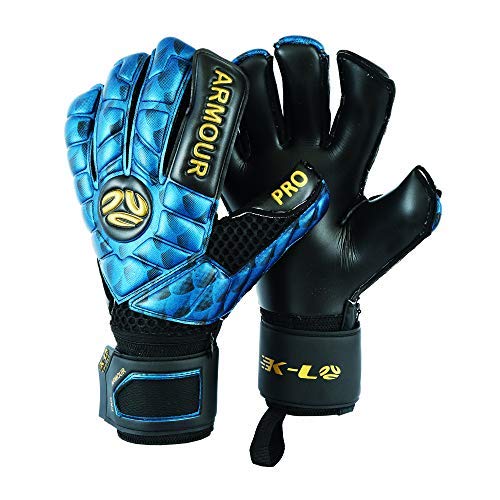Share the post "Goalie Gloves Size Chart: Your Guide to the Perfect Fit!"
As keepers, our hands are our most important instruments. Like a warrior choosing their shield, we must carefully choose our goalkeeper gloves. Finding the perfect fit maximizes grip and control and promotes comfort during the game, which can make or break a save. Understanding glove sizing and how it affects our hand shape and playing style is crucial to choosing the right pair.
From palm width to finger length, essential measurements are taken and compared to a goalie glove size chart. Sizing may vary by brand, so follow brand requirements. varying goalies need varying levels of flexibility and padding, so our playing style may effect our glove choice. Finding the proper pair of gloves requires evaluating how they may adjust over time.
Key Takeaways
- The appropriate goalie gloves are essential for comfort and performance.
- Correct hand measurements assure a standard size chart fit.
- Personal playing style and brand sizing are factors.
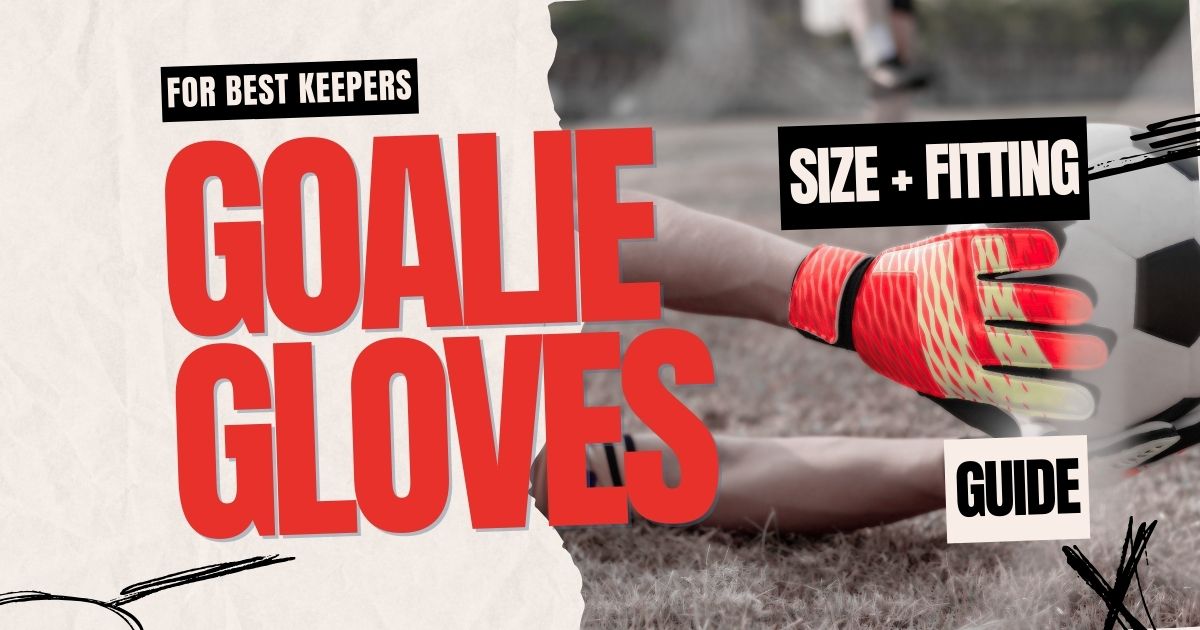
Understanding Goalie Glove Sizing
We know how crucial it is to find that perfect pair of goalie gloves, ensuring both comfort and performance. Let’s dive into the specifics of glove sizing so we can make those game-winning saves!
Anatomy of a Goalie Glove
Each part of the goalie glove contributes to its overall function and fit. We have the palm, which should have a tacky surface to enhance grip. The backhand provides cushioning; fingersaves are built-in spines that offer finger protection, and the closure secures the glove on the hand. Finally, the cut of the glove determines its fitting style – whether it’s flat, rolled, negative, or hybrid.
Importance of Proper Fit
A proper fit is non-negotiable in our game! Tight gloves might restrict movement, while loose ones could slip off or limit our control. By ensuring a snug fit, we maintain dexterity and improve ball handling, which are vital during those split-second decisions.
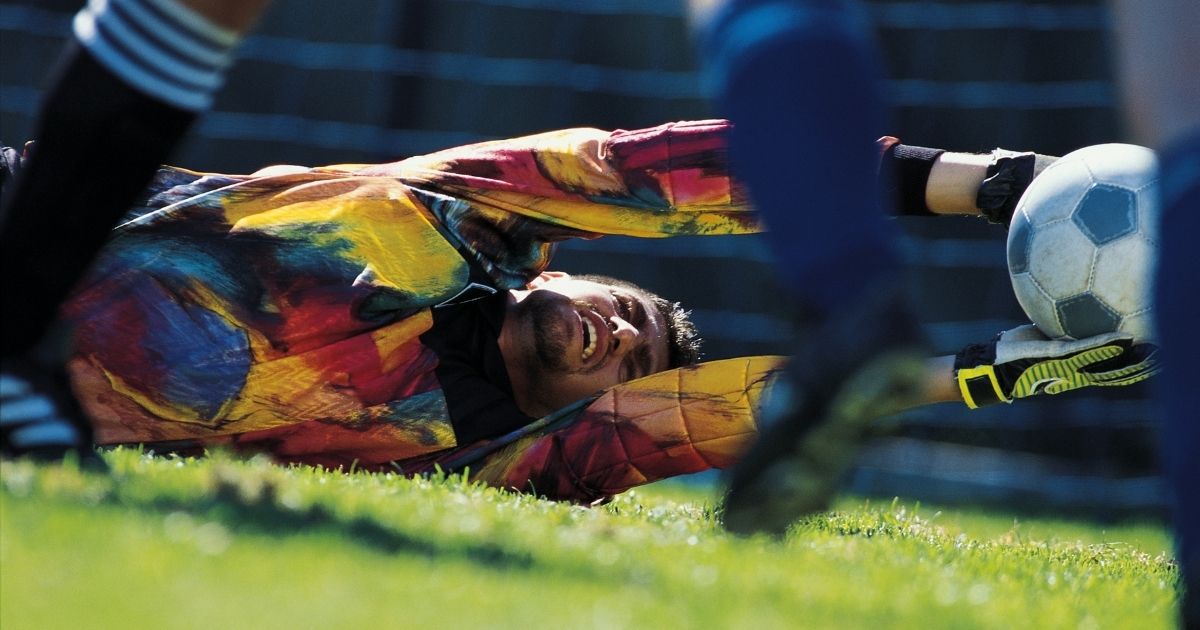
Key Measurements for Goalie Gloves
When we’re on the hunt for the ideal goalie gloves, it’s crucial that we focus on three key measurements: Hand Width, Hand Length, and Finger Spine Support. Getting these measurements right ensures a snug fit that doesn’t compromise our mobility or comfort.
Hand Width
To measure our hand width, we wrap a measuring tape around the widest part of our hand, just below the knuckles, excluding the thumb. This measurement is essential as it influences the overall fit and grip of the glove. Here’s how to do it:
- Wrap the tape: Measure just below the knuckles
- Record the size: Note down the width in inches or centimeters
Hand Length
Next, we need to measure from the tip of our middle finger down to the base of our palm. This length impacts how well the gloves conform to our fingers, crucial for fingertip saves.
- Measure fingertip to palm: Stretch the tape from the middle finger to the palm base
- Size correctly: Accurate measurements prevent excess material at the fingertips
Finger Spine Support
Finger spine support is about more than just size; it’s about protection. Our gloves should have finger spines that align with our finger joints, preventing hyperextension during play.
- Check spine alignment: Ensure spines game up with our finger joints
- Opt for adjustability: Look for gloves with removable spines for customised support
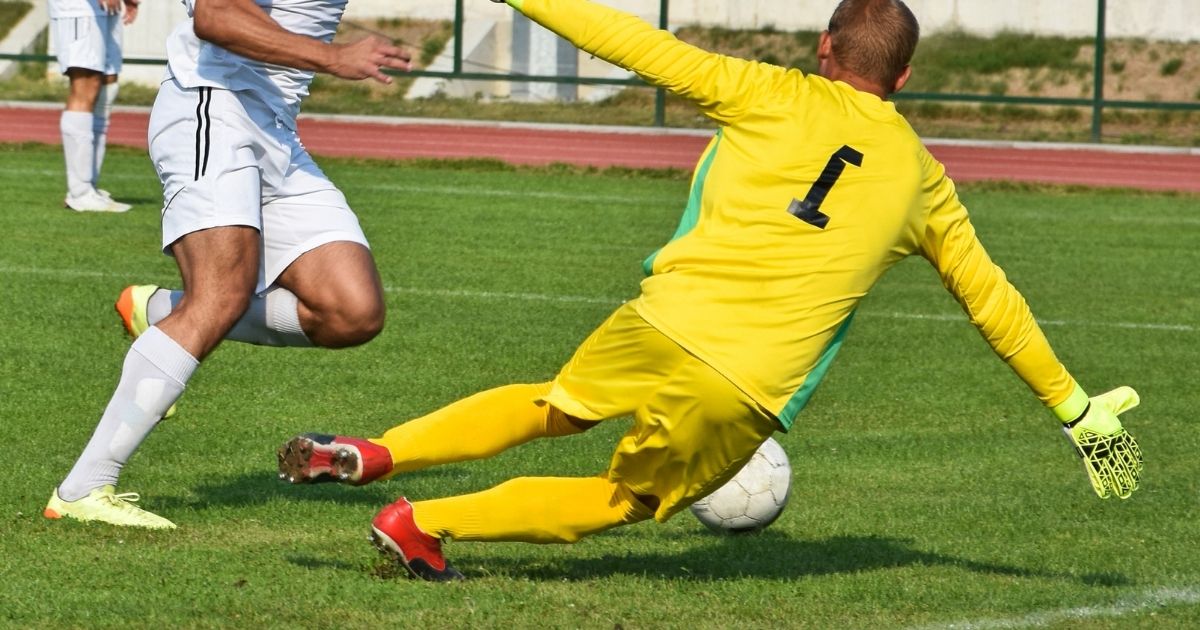
Size Chart Breakdown
In this section, we’re diving into the specifics of goalie glove sizes to ensure keepers have the best fit. Whether you’re a budding young goalkeeper or an experienced adult, correct sizing is crucial for optimal performance and comfort. First we will take a general overview at the sizes and then a real measure-up.
Kids’ Sizes
For our young goalkeepers, finding the right glove size is essential for both training and game play. Kids’ sizes typically range from size 4 to 7. Here’s a quick reference:
- Size 4: Usually for ages 6 to 7
- Size 5: For ages 8 to 9
- Size 6: Ages 10 to 11
- Size 7: Kids 12 to 13
Remember to allow about 1/4″ to 1/2″ of extra room for growing hands and to avoid a tight, restrictive fit.
Adult Sizes
As adults, we have a wider range of sizes, going from size 7 to 11 and beyond. It’s vital we focus on a secure fit that still allows for a full range of motion. Adult sizes are generally divided as follows:
- Size 7: Small adult or large youth
- Size 8: Medium adult
- Size 9: Large adult
- Size 10: X-Large adult
- Size 11: XX-Large adult
For the perfect fit, measure the width and length of your palm and compare it to the manufacturer’s size chart.
Unisex Sizing Tips
We want everyone to experience a perfect glove fit, so here are our unisex sizing tips:
- Measure palm circumference without including the thumb.
- Add extra space, roughly the width of a thumb, for the best fit.
- Consult the goalie glove size chart as sizing can vary between brands.
Adhering to these guidelines will help ensure a comfortable, snug fit regardless of gender.
Best 3 Goalie Gloves
Product: Updated 2024-07-20 | Images: Amazon Product Advertising API | #ad - soccerblade.com is an Amazon Associate
How to Measure Your Hand for Goalie Gloves
We’re going to dive right into the process of measuring our hands for the perfect goalie glove fit. It’s a simple but crucial process to ensure we’re comfortable and secure on the field!
Step 1: Get a Measuring Tape! You’ll want a flexible measuring tape for accuracy.
Step 2: Measure the Circumference
Wrap the measuring tape around the widest part of our hand, excluding the thumb. Note this measurement — it’s key for proper fit.
| Hand Part | Measurement |
|---|---|
| Widest Part | Circumference in inches/centimeters |
Step 3: Measure the Length
We then measure from the base of our palm to the tip of our middle finger. This length helps determine the right size for length coverage.
| Hand Part | Measurement |
|---|---|
| Length | Base of palm to middle finger tip in inches/centimeters |
Step 4: Refer to a Sizing Chart
Once we have our measurements, it’s time to game them to a sizing chart. Remember, sizes can vary between brands, so let’s make sure we’re checking the right one!
| Glove Size | Hand Measurement (inches) | Hand Measurement (cm) | Age/Size Category |
|---|---|---|---|
| 4 | 5.5 – 6 | 13.97 – 15.24 | Ages 6-7 |
| 5 | 6 – 6.5 | 15.24 – 16.51 | Ages 8-9 |
| 6 | 6.5 – 7 | 16.51 – 17.78 | Ages 10-11 |
| 7 | 7 – 7.5 | 17.78 – 19.05 | Ages 12-13 |
| 8 | 7.5 – 8 | 19.05 – 20.32 | Small Adult/Teen |
| 9 | 8 – 8.5 | 20.32 – 21.59 | Medium Adult |
| 10 | 8.5 – 9 | 21.59 – 22.86 | Large Adult |
| 11 | 9 – 9.5 | 22.86 – 24.13 | XL Adult |
| 12 | 9.5 – 10 | 24.13 – 25.4 | XXL Adult |
To convert inches to centimeters, the general rule is that 1 inch is equivalent to 2.54 centimeters. The measurements in centimeters here are approximate and rounded to two decimal places for easier reference. As always, check the specific brand’s size chart for the most accurate fit.
Tips:
- If we’re between sizes, round up for extra comfort.
- Consider the thickness of our wrist, as some gloves have tighter fits around the wrist area.
- A little extra room can help with comfort and mobility, but too much can compromise our grip and control.
We’re now equipped with the knowledge needed to select gloves that feel as though they’re tailored just for us. Grab our measuring tape, and let’s get started on our journey to the perfect glove fit!
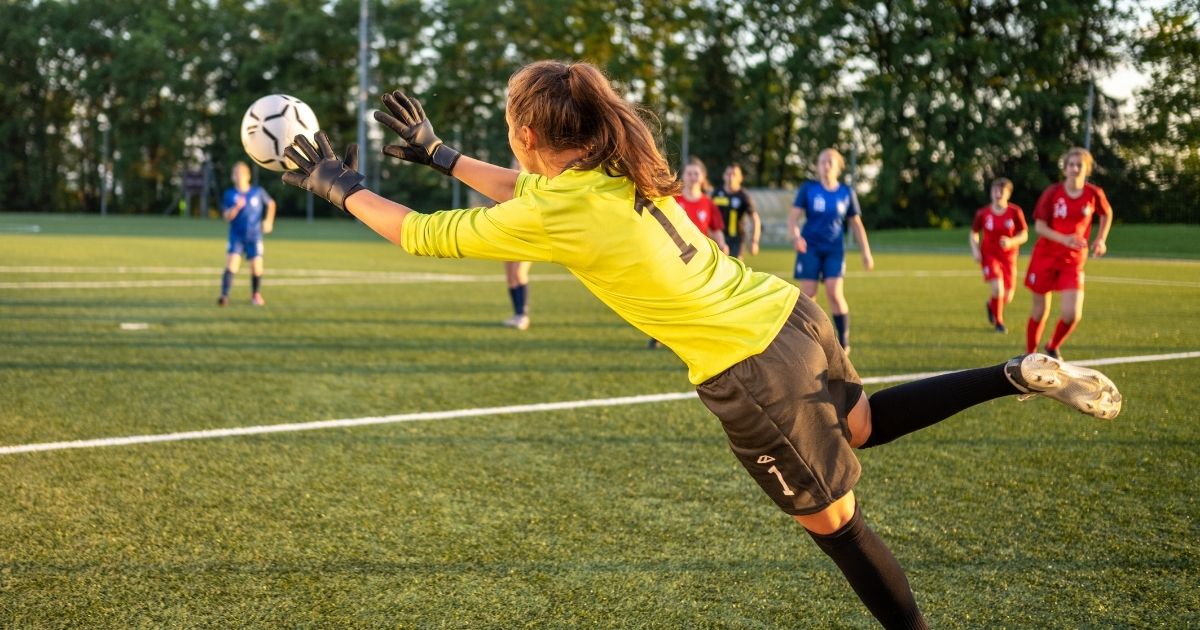
Selecting the Right Glove Based on Play Style
When we step onto the field as goalkeepers, our gloves become an extension of our hands, and crucially, they must complement our play style. There’s an invigorating rush in finding that pair of gloves that feels like it was made just for us—enhancing our grip, control, and confidence between the posts.
For the Commanding Goalkeeper: We love to dominate the box, right? We need gloves that offer outstanding grip and cushioning to handle those powerful shots and crosses. Look for gloves with thicker foam padding and high-grip palm surfaces.
- Shot Stoppers:
- Thick foam padding
- Enhanced grip technology
For the Agile Goalkeeper: If our approach is more about quick reflexes and agility, then lightweight gloves with negative or tight cut will be our best buddies. These gloves often have less padding to maximize our natural feel for the ball—which can make all the difference in those split-second decisions.
- Acrobatic Saves:
- Negative/tight cut
- Lightweight construction
For the All-Rounder Goalkeeper: We aim to strike a balance between cushioning and mobility, choosing roll finger or hybrid cut gloves. These versatile options offer a snug fit and better range of movement, providing us with a secure grip and adaptable control for all kinds of saves.
- Both World Abilities:
- Roll finger/hybrid cut
- Balanced padding and touch
Let’s delight in the journey to find the perfect glove that aligns with our vibrant play style. It’s out there waiting for us—our trusty sidekick in every game!
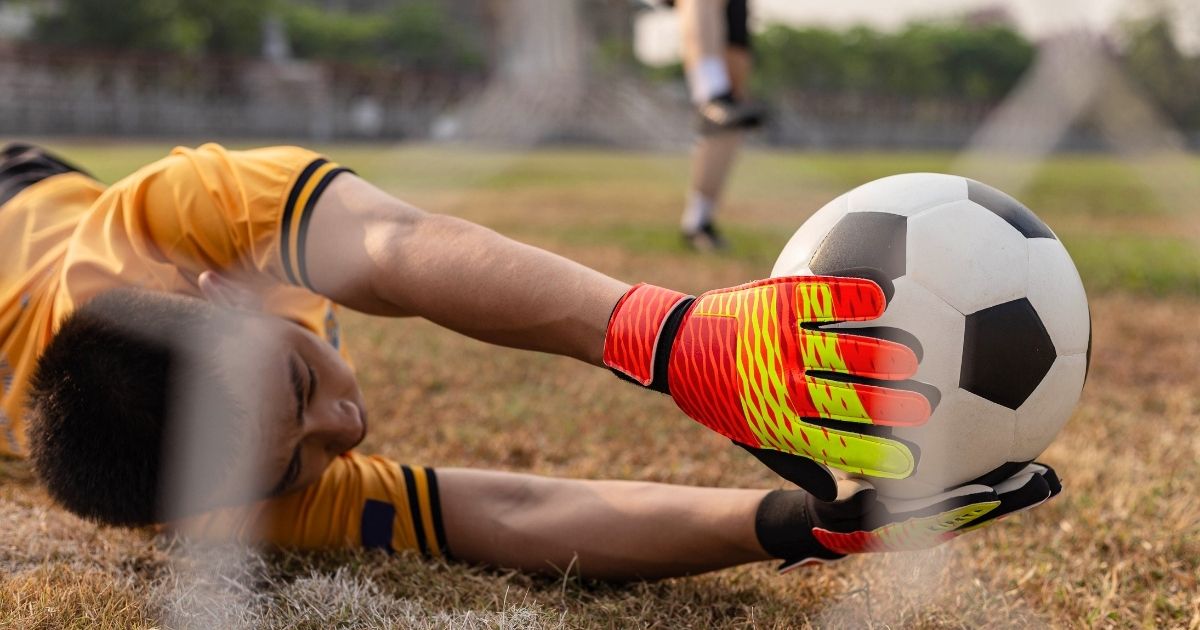
Adjusting to New Gloves
When we get a new pair of goalkeeper gloves, it’s crucial for us to spend time getting used to them. The grip and feel of new gloves can be significantly different from what we’re accustomed to, and a proper break-in and maintenance routine ensures they perform at their best.
Break-In Period
When we first acquire new gloves, the break-in period is key to optimizing performance. We typically start with some light training sessions, where we focus on getting used to the feel of the glove and the surface of the ball. It’s important for us to remember that during this phase, the gloves may feel stiffer and less responsive. As we continue to use them, the materials will naturally flex and conform to the shape of our hands, enhancing comfort and grip.
Care and Maintenance
Proper care and maintenance are what keep our gloves in top condition after they’ve been broken in. Here’s our essential routine:
- Clean the gloves after each use with a mild detergent to remove dirt and maintain grip.
- Allow them to air dry naturally, away from direct heat sources to preserve the materials.
- Store them correctly by placing a small amount of space between them to avoid compression, which can degrade the foam.
Remember, a well-maintained pair of gloves not only lasts longer but also offers consistent performance through many games and training sessions.
Brand Specific Sizing Variations
When we dive into the world of goalkeeping, we immediately notice that not all goalie gloves are created equal—especially when it comes to sizing! Different brands have slight variations that could be the difference between a good fit and a superb fit.
For instance, adidas tends to offer a tighter fit, giving goalkeepers a snug and responsive feel. In contrast, gloves by Reusch may have more room, which is great for keepers who prefer a bit more space or plan to layer with glove liners.
Here’s a quick breakdown:
- Adidas: Snug fit – consider sizing up if between sizes
- Reusch: Roomier – great for extra layers or wider hands
- Nike: Standard fit – often consistent with most sizing charts
- Puma: Varies by model – check specific size guides
It’s paramount for us to remember that our best bet is to always check the specific brand’s sizing chart. Thankfully, resources like this can guide us as a general starting point, but each brand’s nuances can fine-tune our choice.
To streamline your selection process, make a quick list of brands you’re interested in and jot down your hand measurements. Cross-reference these with brand-specific size guides; a little research can ensure you find gloves that feel like they were made just for you. Brands. Remember, a well-fitting glove could be the difference-maker in your next big save!
Frequently Asked Questions
When we’re on the hunt for the perfect goalkeeper gloves, we often come across questions that we need answers to. Here’s a quick rundown of some FAQs to guide us through finding our next great pair of goalie gloves!
What size gloves do goalkeepers wear?
Goalie glove sizes can vary widely. To find our size, we measure from the tip of our middle finger to the base of our hand and then consult a goalkeeper glove size guide to find the perfect game.
Should goalie gloves be tight or loose?
Our gloves should fit snugly. They should not be too tight, causing discomfort, or too loose, leading to a lack of control. A good rule of thumb is to aim for about a 1/4″ to 1/2″ of space over our fingertips, ensuring we have enough room without the gloves feeling sloppy.
How long should goalkeeper gloves last?
The longevity of our gloves depends on the frequency of use and the quality of care. Training gloves may wear out faster compared to game gloves. Looking after them by keeping them clean and dry will help extend their life.
Why do goalkeeper gloves have spikes or latex palms?
Gloves with spikes, also known as finger protection, help to prevent finger injuries. The latex palms are vital for grip when catching or punching the ball, especially in adverse weather conditions.
By knowing these key aspects, we’re better equipped to select our perfect pair of goalie gloves. Remembering these points ensures we step onto the field with confidence and proper hand protection!
Share the post "Goalie Gloves Size Chart: Your Guide to the Perfect Fit!"
Joel is a seasoned soccer journalist and analyst with many years of experience in the field. Joel specializes in game analysis, player profiles, transfer news, and has a keen eye for the tactical nuances of the game. He played at various levels in the game and coached teams - he is happy to share his insight with you.

